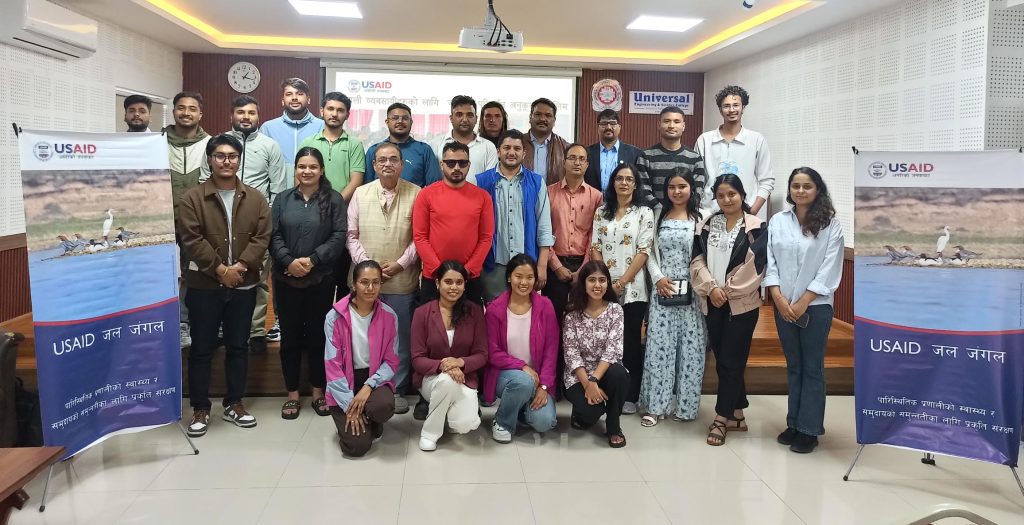Climate Change Adaptation Training for Nepalese Businesses Successfully Completed, Reaching Over 3,500 MSMEs
Kathmandu, Nepal—October 17, 2024
In a milestone initiative, the “Climate Change Adaptation Training for Nepalese Businesses” training program has been successfully completed on 30 September 2024, enhancing the capacity of the Micro, Small, and Medium Enterprises (MSMEs) across 16 districts in Nepal with essential tools to combat climate change. The activity was jointly organized by the Center of Research for Environment, Energy and Water (CREEW), Development Support Consult (DSC), and International Center for Applied Sciences, Universal Engineering & Science College (ICAS/UESC). The training activity is part of the USAID Biodiversity (Jal Jangal) program. This initiative represents a crucial step in integrating climate adaptation and biodiversity conservation into Nepal’s business ecosystem.

Prof. Dr. Amod Mani Dixit (President, ICAS), sharing insights on effective training techniques and non-verbal communication during Training of Trainers
The program, aimed at reaching 3,500 MSMEs, officially launched with a comprehensive Training of Trainers (ToT) workshop held on August 27-28, 2024. Participants from diverse sectors, including engineering, environmental science, and agriculture, attended the ToT, where they honed their skills in delivering climate-focused content to businesses. Notable speakers included Prof. Dr. Amod Mani Dixit (President, ICAS), who shared insights on non-verbal communication and effective training techniques, and Mr. Lalit Pathak (Research Associate, CREEW), who introduced the curriculum and delivery methods. Dil Bishwakarma, Private Sector Partnership Specialist from USAID Biodiversity, emphasized the importance of local government collaboration, suggesting MSMEs engage with Enterprise Development Facilitators (EDF) to ensure the successful completion of activities.
Following the ToT, the program embarked on a large-scale training effort, scheduling 70 training events across five provinces: Sudurpashchim, Lumbini, Karnali, Gandaki, and Bagmati. Each event consisted of two-day sessions totaling 16 hours, tailored to a range of sectors, including agriculture, tourism, handicrafts, and food and beverage industries. Special emphasis was placed on ensuring the participation of women and marginalized groups.

Participants of Training of Trainer conducted for lead and co trainers
Training Activities and Impact
The training successfully reached 3,591 MSMEs. Participation of women and marginalized people was significant with 82% of the total. The trainers reported enthusiastic participation, with significant improvements in participants’ understanding of climate change adaptation. The curriculum was specifically designed to address Nepal’s unique socio-physical and climate-specific contexts, covering topics such as climate-resilient supply chains, access to climate finance, and risk management strategies.
A key feature of the training was its practical, hands-on approach. The two-day sessions were structured around eight modules, including introductions to biodiversity conservation, the impacts of climate change on MSMEs, and adaptation initiatives. Case studies and group work allowed participants to apply theoretical knowledge to real-world challenges. Pre- and post-training assessments revealed a significant increase in understanding, with average test scores ranging from 45.5% to 75.6%. The project also distributed leaflets tailored to MSMEs, ensuring businesses could continue to access climate adaptation strategies.

Locations of different training event: Conducted in four conservation landscapes covering 16 districts
Collaboration with Local Governments
Crucial to the program’s success was the involvement of local governments, who played an active role in training facilitation. Local governments supported the training activities, offering logistic support, providing venues, and mobilizing participants. In return, local enterprises gained valuable knowledge that many governments are now willing to incorporate climate changes issues into their policies and programs on MSMEs, such as Disaster Preparedness and Response Plans.
The strong collaboration between local governments and MSMEs is expected to enhance long-term climate resilience within Nepal’s varied communities. Local government representatives also attended training sessions, ensuring that businesses and authorities are aligned in their climate adaptation efforts.
Challenges and Solutions
While the program met its objectives, it faced several challenges, particularly in remote districts like Darchula, where infrastructure and transportation issues posed difficulties during the monsoon. Trainers also had to navigate varying levels of climate change knowledge among participants, thus adapting their delivery methods to ensure effective learning. Key takeaways from the program included the importance of customizing content to suit participants’ backgrounds, using participatory methods to enhance learning, and much earlier coordination with local governments to ensure smooth logistic planning.
Appreciation Workshop
To mark the successful conclusion of the training activities, an Appreciation Workshop was organized on September 27, 2024. Representatives from USAID Biodiversity (Jal Jangal), ICAS/UESC, DSC, CREEW, and trainers gathered to share and review the program’s achievements. Trainers shared success stories, challenges faced, and local climate adaptation practices that had been adopted during the course of the training. The event highlighted the program’s substantial impact on building climate resilience among MSMEs in Nepal. Moving forward, the program aims to continue empowering businesses to adopt climate-resilient practices, contributing to Nepal’s broader goals of sustainable development and biodiversity conservation.

A group photo taken during appreciation workshop after the completion of all the training events

Trainers sharing their experience challenges and learning during trainings

Trainers sharing their experience challenges and learning during trainings

Participant collecting the impacts of climate change on their Business using meta card at Dungeshwor Rural Municipality

Training event at Lamahai municipality ward-1 Dang

Problems faced by enterprises in Shantinagar rural municipality presented by participants during the group work session

Group work presentation after group work session at Dungeshwor Rural Municipality

